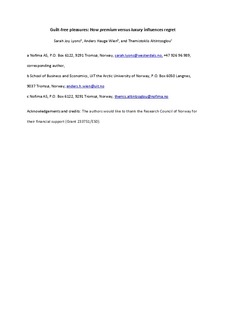Guilt-free pleasures: how premium and luxury influence regret
Journal article, Peer reviewed
Submitted version
Permanent lenke
http://hdl.handle.net/11250/2593176Utgivelsesdato
2019Metadata
Vis full innførselOriginalversjon
10.1108/JPBM-02-2018-1764Sammendrag
Purpose
The purpose of this study was to investigate how a consumer’s intention to purchase a premium or luxury product influences the anticipated regret and guilt.
Design/methodology/approach
A 2 × 2 × 2 between-subjects design (label: premium versus luxury × prior event: success versus failure × product type: hedonic versus utilitarian) on guilt and regret was implemented.
Findings
Following a successful event, the anticipated regret and guilt are lower for a hedonic product compared to a primarily utilitarian one. The effect was valid when the consumers were looking to buy both luxury and premium. In a situation following a failure, the anticipated levels of regret and guilt were lower for a product that was primarily utilitarian in nature; however, this effect only appeared when the participants were looking to buy both luxury and not premium.
Research limitations/implications
People may feel more licensed to indulge in a hedonic premium or luxury product after a success and more licensed to indulge in a utilitarian luxury product after a failure.
Practical implications
The results can be used to understand how to optimize a marketing message of indulgence whether or not one deserves it.
Originality/value
The study provides novel insight into how anticipated guilt and regret may be evoked by the goal of buying a premium versus luxury product in combination with the product type and a consumer’s experience of a prior event.

